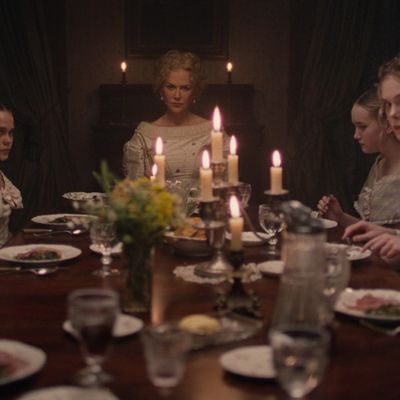
What if Sofia Coppola were to go full gothic horror? There were suspicions she might when the first looks at The Beguiled went around earlier this year. Even for someone who, full disclosure, is in the minority of being an anti-fan of Coppola’s work, this was intriguing. I’m usually not one to call for violence for violence’s sake, but Coppola’s idealized, fashionable aesthetic could potentially benefit from a splash of viscera. Have any of her characters ever screamed?
Colin Farrell could be the first — he’s seen in the trailer hollering the great, hashtag-ready de facto tagline: “You vengeful bitches!” But he’s offscreen when he delivers it in the film itself, and it’s in reaction to a standard if grisly medical procedure, also offscreen. Because The Beguiled, for all its foreboding and fog, is not that movie. The problem is I’m not sure what movie it is, and why it is at all. As a thrilling yarn, it’s too campy to be suspenseful; as a revenge movie, it’s too polite to feel rewarding. It’s “about” men and women in the way that a shoe store is “about” shoes: It has them.
Based on a novel by Thomas P. Cullinan (which was also adapted in a 1971 version starring Clint Eastwood) the story takes place in Virginia during the downslope of the Civil War. Union soldier John McBurney (Farrell) is found wounded and taken in by a girls seminary headed by Martha Farnsworth (Nicole Kidman). His presence is an electrifying bolt from the blue for the seven residents at the school, including teacher Edwina (Kirsten Dunst) and rebellious teen Alicia (Elle Fanning.) Meanwhile, John begins manipulating his female hosts, attempting to curry their loyalty to him above each other. For youngest student Anna, he’s a doting father figure, but for Martha, Edwina, and Alicia, he’s a firecracker of sexual promise. When that firecracker eventually misfires, havoc ensues, albeit the most uninspired havoc you can imagine coming out of this charged situation.
I spent a chunk of the film wondering what here excited Coppola — what was it about the novel that she couldn’t wait to bring to the screen? I could see flickers of directorial affection in the warm, candlelit preparations for the seminary dinners and satin ribbons luxuriously knotted around braids. Philippe Le Sourd’s dreamy cinematography takes especially well to these dress-up scenes: The girls circle around Kidman for their evening prayers in a billow of pastel, in stark contrast to Farrell in Yankee navy. But there’s nothing elucidated by these dreamy visions of femininity, no larger idea Coppola is getting at besides the most basic mating behavior. It lends itself to some wry, well-delivered comic bits, but nothing here leaves a mark.
Similarly, the plot is what it is and not much more. If you go in knowing the barest bones of the story, it’s fairly easy to imagine where it goes, and it rarely deviates or finds any strange nooks or detours along the way that might offer a different perspective on the main path. We see little of the women’s lives or relationships with each other outside the conflict with John — a colleague pointed out that the plot seemingly exists to troll the Bechdel test. I imagine most harem anime has more character development than The Beguiled. So will the inevitable porn parody (though I kind of wish the film itself was a porn parody.)
Which is too bad, because Kidman and Dunst are especially great given the slightness of what they have to work with. Edwina’s character and relationship with John have reportedly been considerably reduced from previous versions of the story, but Dunst brings a desperately world-weary sadness to the character — a woman once resigned to being an old maid schoolmarm, now alight with the possibilities of another life. And Kidman is sharp and fully cognizant of the camp factor, and balances it nicely.
Still, you get the feeling that she — or any of the rest of the female cast — would have loved to close out the film holding up Farrell’s bloody severed head (or any other piece of anatomy, for that matter.) As it happens, Coppola purposefully keeps the women from straying outside gender roles, down to the classically feminine way they ultimately deal with John. She’s created an isolated, fundamentally peaceful matriarchy, where one never resorts to brutality, even when dealing with an enemy soldier and/or fuckboy. It’s a great dramatic idea, except for the fact that there’s almost no drama to be found. Who knew the Civil War could be so very civil?




